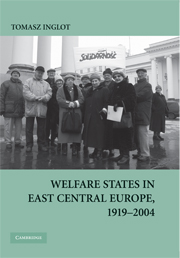Book contents
- Frontmatter
- Contents
- Figures and Tables
- Acknowledgments
- Welfare States in East Central Europe, 1919–2004
- Introduction: Understanding Past and Present Social Policy Development in East Central Europe
- 1 The Welfare State in East Central Europe: A Conceptual and Theoretical Reconsideration
- 2 Institutional Legacies: State Building, Regime Change, and the Development of National Welfare States in Czechoslovakia, Poland, and Hungary, 1919–1989
- 3 Policy Legacies and Welfare States under Communism: Cycles of Social Policy Expansion and Retrenchment in Czechoslovakia, Poland, and Hungary, 1945–1989
- 4 Historical Legacies, Welfare State Institutions, and the Politics of Social Policy Reforms in Postcommunist East Central Europe, 1989–2004
- Conclusion: Postcommunist “Emergency” Welfare States and Theoretical Exploration of Institutional Change and Social Policy Development
- Bibliography
- Index
- References
Bibliography
Published online by Cambridge University Press: 25 July 2009
- Frontmatter
- Contents
- Figures and Tables
- Acknowledgments
- Welfare States in East Central Europe, 1919–2004
- Introduction: Understanding Past and Present Social Policy Development in East Central Europe
- 1 The Welfare State in East Central Europe: A Conceptual and Theoretical Reconsideration
- 2 Institutional Legacies: State Building, Regime Change, and the Development of National Welfare States in Czechoslovakia, Poland, and Hungary, 1919–1989
- 3 Policy Legacies and Welfare States under Communism: Cycles of Social Policy Expansion and Retrenchment in Czechoslovakia, Poland, and Hungary, 1945–1989
- 4 Historical Legacies, Welfare State Institutions, and the Politics of Social Policy Reforms in Postcommunist East Central Europe, 1989–2004
- Conclusion: Postcommunist “Emergency” Welfare States and Theoretical Exploration of Institutional Change and Social Policy Development
- Bibliography
- Index
- References
Summary

- Type
- Chapter
- Information
- Welfare States in East Central Europe, 1919–2004 , pp. 315 - 340Publisher: Cambridge University PressPrint publication year: 2008



